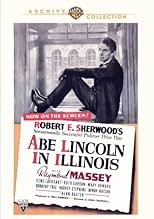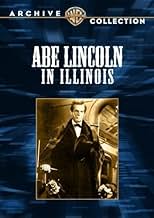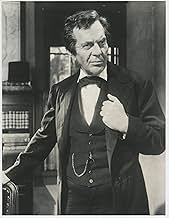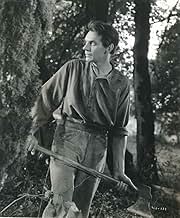IMDb-BEWERTUNG
7,3/10
2211
IHRE BEWERTUNG
Füge eine Handlung in deiner Sprache hinzuHumble Abraham Lincoln gains the respect of his Illinois neighbors, growing in stature and respect until he is elected President in 1860 and departs for Washington.Humble Abraham Lincoln gains the respect of his Illinois neighbors, growing in stature and respect until he is elected President in 1860 and departs for Washington.Humble Abraham Lincoln gains the respect of his Illinois neighbors, growing in stature and respect until he is elected President in 1860 and departs for Washington.
- Für 2 Oscars nominiert
- 2 Gewinne & 2 Nominierungen insgesamt
Howard Da Silva
- Jack Armstrong
- (as Howard da Silva)
Empfohlene Bewertungen
Episodic recounting of Lincoln's life up to the Presidency. Written by Robert Sherwood, one of FDR's speechwriters. Good performances by Ruth Gordon, Alan Baxter, Howard DaSilva, Clem Bevans.
Massey is the definitive movie Lincoln. Excellent work, emotional range and depth. Much better than Henry Fonda, whose Lincoln was apparently in some kind of trance.
May seem a little dated to modern audiences; occasionally strives for emotional poignancy that now comes across as somewhat corny.
Lots of little details, good depictions of frontier life, political campaigns in the 1800's. Includes two of Lincoln's best speeches from that period, with Massey's performance very close to Lincoln's 19th century oratorical style.
Highly recommended to students of American history and fans of old movies.
Massey is the definitive movie Lincoln. Excellent work, emotional range and depth. Much better than Henry Fonda, whose Lincoln was apparently in some kind of trance.
May seem a little dated to modern audiences; occasionally strives for emotional poignancy that now comes across as somewhat corny.
Lots of little details, good depictions of frontier life, political campaigns in the 1800's. Includes two of Lincoln's best speeches from that period, with Massey's performance very close to Lincoln's 19th century oratorical style.
Highly recommended to students of American history and fans of old movies.
If only we could've cloned Mr. Massey back in 1940, and then waited for a scriptwriter who could take a more controlled hand with historical accuracy than was fashionable in those days, and released the movie today...this remains my favorite treatment of one of my favorite historical figures; Massey seems born to have played Lincoln, from the obvious physical resemblance to the supposed mannerisms, and in doing so far outshines other Lincoln performances (Fonda's and Peck's come to mind). My peeve with the film is with historical detail, and I realize that Hollywood willingly sacrifices accuracy for dramatic artifice without so much as a blush...
10lugonian
ABE LINCOLN IN ILLINOIS (RKO Radio, 1940), directed by John Cromwell, is not so much a biography of Abraham Lincoln, but the life Lincoln lived from his early years to a position that would lead him to politics, and against all odds, his winning the election for the United States presidency in 1860. Based on the Pulitzer Prize winning 1938 play by Robert E. Sherwood, the screen adaptation, tracing Lincoln's thirty years starting in 1831 to his train ride leading to Washington, D.C., in 1861, stars Raymond Massey in a role he originated on stage, being the best performance of a great American ever enacted by an actor who wasn't. Massey, a Canadian by birth, is not only the perfect candidate for the title role, but an ideal choice. Massey's believability in his role earned him an Academy Award nomination as Best Actor. Although he didn't win the election for that year, it is Massey who very well holds this movie together.
A follow-up of sorts to John Ford's most recent YOUNG MR. LINCOLN (20th Century-Fox, 1939), starring Henry Fonda, focusing on Lincoln's early years as a young lawyer in Springfield, Ill., and a retelling in parts to D.W. Griffith's ABRAHAM LINCOLN (United Artists, 1930), starring Walter Huston, ABE LINCOLN IN ILLINOIS starts off on a rainy afternoon in 1831 with an introduction to the character of Abraham Lincoln (Raymond Massey), age 22, sitting on the floor in a log cabin reading a book by Shakespeare, accompanied by his father (Charles B. Middleton) and a stepmother (Elisabeth Risdon). With the Lincoln family background briefly depicted, the next scene follows Abe, who had left home to accept a $30 a month job as part of the crew rowing a flatboat hauling hogs down the Sangamon River to New Orleans. Along the way he encounters a very beautiful girl named Ann Rutledge (Mary Howard), with whom he decides to settle down in her native town of New Salem where he becomes in charge of a general store, a position offered him by his employer, Denton Offut (Harlan Briggs). When he finds Jack Armstrong (Howard Da Silva), the greatest fighter who cannot be beat, a little drunk and annoying Ann, who, along with his other friends, having invaded her tavern, Abe, a stranger in town, comes to the young lady's defense and publicly wrestles Jack to the end, defeating his advisory and winning the admiration from all, especially the respect and loyal-ship of Jack Armstrong. The year 1832 profiles Lincoln acting as leader in command of his soldiers, with Armstrong being among them, during the Blackhawk War period; 1835 now finds Lincoln in a new position as postmaster general. He is visited by Joshua Speed (Minor Watson) and Ninian Edwards (Harvey Stephens) who introduce Abe to politics by choosing him to serve in the legislature, which he would serve four terms. As for Ann, having been engaged to John McNeil (Maurice Murphy), now living in New York for two years, finds that after receiving a letter from him that he has no intentions of returning to her. To stop gossip from circulating around Ann's good name, Abe admits his love for her from the moment he first saw her, and asks her to become his steady. The relationship between them is cut short when she is stricken with an illness and dies. Lincoln quits the legislation to work in the law office with John Stuart in Springfield, forming a partnership of Stuart & Lincoln, Counselors-at-Law. Slowly improving his social position, Lincoln is introduced to Mary Todd (Ruth Gordon) at a function given by her sister and Ninian's wife, Elizabeth Edwards (Dorothy Tree). Elizabeth wants Mary to marry an aristocrat, someone like Stephen A. Douglas (Gene Lockhart), but her interest rests on Mr. Lincoln, whom she eventually marries on November 4, 1842. The marriage produces four sons (the movie indicates three, eliminating one who died in his fourth year), and shows Mary's fight in having her hayseed husband fulfill his destiny, to become president of the United States.
Ruth Gordon (1896-1985), a prominent stage actress and playwright, in her movie debut, gives a remarkable performance in one of the best carnations of Mary Todd Lincoln ever portrayed on screen. Gene Lockhart (1892-1957), a veteran character actor in many feature film roles, goes unnoticed as a very satisfying Stephen A. Douglas (1813-1861). Lockhart's best moment finds his Stephen Douglas sincerely congratulating his opponent Abraham Lincoln in winning the U.S. election, something that should become a prime example with modern-day candidates.
As mentioned before, ABE LINCOLN IN ILLINOIS is very much a retread to D.W. Griffith's 1930 presentation of ABRAHAM LINCOLN, with differences being the elimination of Lincoln's birth, his trying years in the White House during the Civil War and assassination in April 1865. In many ways, ABE LINCOLN IN ILLINOIS is an excellent movie with excellent portrayals. Being a screen adaptation to a stage play, John Cromwell's direction, makes no indication as such. Minus Technicolor, it's full of outdoor scenery and historical detail ranging from costumes to reproductions of small towns. Highlights include the well staged Lincoln-Douglas debate, and one where Lincoln finally losing his temper towards his wife, Mary, after embarrassing him in front of his committee, by ordering her, twice, "You're not/never to do that again!"
ABE LINCOLN IN ILLINOIS, formerly shown on commercial television annually either on or around Lincoln's birthday, February 12, later presented on video cassette finally on cable television's American Movie Classics prior to 2000, and Turner Classic Movies. Quite enjoyable as a motion picture, and quite informative on a historical point of view, this production, at 110 minutes, succeeds on both counts. "Glory, Glory Hallelujah, his truth is marching on." (****)
A follow-up of sorts to John Ford's most recent YOUNG MR. LINCOLN (20th Century-Fox, 1939), starring Henry Fonda, focusing on Lincoln's early years as a young lawyer in Springfield, Ill., and a retelling in parts to D.W. Griffith's ABRAHAM LINCOLN (United Artists, 1930), starring Walter Huston, ABE LINCOLN IN ILLINOIS starts off on a rainy afternoon in 1831 with an introduction to the character of Abraham Lincoln (Raymond Massey), age 22, sitting on the floor in a log cabin reading a book by Shakespeare, accompanied by his father (Charles B. Middleton) and a stepmother (Elisabeth Risdon). With the Lincoln family background briefly depicted, the next scene follows Abe, who had left home to accept a $30 a month job as part of the crew rowing a flatboat hauling hogs down the Sangamon River to New Orleans. Along the way he encounters a very beautiful girl named Ann Rutledge (Mary Howard), with whom he decides to settle down in her native town of New Salem where he becomes in charge of a general store, a position offered him by his employer, Denton Offut (Harlan Briggs). When he finds Jack Armstrong (Howard Da Silva), the greatest fighter who cannot be beat, a little drunk and annoying Ann, who, along with his other friends, having invaded her tavern, Abe, a stranger in town, comes to the young lady's defense and publicly wrestles Jack to the end, defeating his advisory and winning the admiration from all, especially the respect and loyal-ship of Jack Armstrong. The year 1832 profiles Lincoln acting as leader in command of his soldiers, with Armstrong being among them, during the Blackhawk War period; 1835 now finds Lincoln in a new position as postmaster general. He is visited by Joshua Speed (Minor Watson) and Ninian Edwards (Harvey Stephens) who introduce Abe to politics by choosing him to serve in the legislature, which he would serve four terms. As for Ann, having been engaged to John McNeil (Maurice Murphy), now living in New York for two years, finds that after receiving a letter from him that he has no intentions of returning to her. To stop gossip from circulating around Ann's good name, Abe admits his love for her from the moment he first saw her, and asks her to become his steady. The relationship between them is cut short when she is stricken with an illness and dies. Lincoln quits the legislation to work in the law office with John Stuart in Springfield, forming a partnership of Stuart & Lincoln, Counselors-at-Law. Slowly improving his social position, Lincoln is introduced to Mary Todd (Ruth Gordon) at a function given by her sister and Ninian's wife, Elizabeth Edwards (Dorothy Tree). Elizabeth wants Mary to marry an aristocrat, someone like Stephen A. Douglas (Gene Lockhart), but her interest rests on Mr. Lincoln, whom she eventually marries on November 4, 1842. The marriage produces four sons (the movie indicates three, eliminating one who died in his fourth year), and shows Mary's fight in having her hayseed husband fulfill his destiny, to become president of the United States.
Ruth Gordon (1896-1985), a prominent stage actress and playwright, in her movie debut, gives a remarkable performance in one of the best carnations of Mary Todd Lincoln ever portrayed on screen. Gene Lockhart (1892-1957), a veteran character actor in many feature film roles, goes unnoticed as a very satisfying Stephen A. Douglas (1813-1861). Lockhart's best moment finds his Stephen Douglas sincerely congratulating his opponent Abraham Lincoln in winning the U.S. election, something that should become a prime example with modern-day candidates.
As mentioned before, ABE LINCOLN IN ILLINOIS is very much a retread to D.W. Griffith's 1930 presentation of ABRAHAM LINCOLN, with differences being the elimination of Lincoln's birth, his trying years in the White House during the Civil War and assassination in April 1865. In many ways, ABE LINCOLN IN ILLINOIS is an excellent movie with excellent portrayals. Being a screen adaptation to a stage play, John Cromwell's direction, makes no indication as such. Minus Technicolor, it's full of outdoor scenery and historical detail ranging from costumes to reproductions of small towns. Highlights include the well staged Lincoln-Douglas debate, and one where Lincoln finally losing his temper towards his wife, Mary, after embarrassing him in front of his committee, by ordering her, twice, "You're not/never to do that again!"
ABE LINCOLN IN ILLINOIS, formerly shown on commercial television annually either on or around Lincoln's birthday, February 12, later presented on video cassette finally on cable television's American Movie Classics prior to 2000, and Turner Classic Movies. Quite enjoyable as a motion picture, and quite informative on a historical point of view, this production, at 110 minutes, succeeds on both counts. "Glory, Glory Hallelujah, his truth is marching on." (****)
This film portrays Abe Lincoln's political rise as a man of the people, from his wrestling brawl with town bully Howard da Silva to his failure as a general store owner and his humble beginning in politics as a town postmaster. The film portrays the women in Lincoln's life and the influence they had on him. Perhaps the most influential woman is the one not shown, his mother, but he shares a moving scene with his step mother as he's leaving home, and then with Ann Rutledge, and finally with Mary Todd played in an unusually interesting way by Ruth Gordon. It's perhaps the influence of these women and their uncertain fates that more than balanced Lincoln's well developed humor with a dark and secret melancholy. That aspect is captured through some of the scenes of Massey's Lincoln shot by legendary cinematographer James Wong Howe. Between him, Massey, and Ruth Gordon, this film seems to carry some serious cinematically induced psychological influences.
If you've ever wanted to hear what Abe Lincoln sounded like, this is the film you'll want to see. Lincoln is portrayed by the late Canadian actor Raymond Massey - who, amongst many other roles, is also remembered from HG Welles' Things to Come, the screenplay of which was written by HG Welles himself. Early in Massey's career, Lincoln's son, Robert Todd Lincoln, heard him perform and was struck by the similarity between Massey's speaking voice and that of his father. Since there are no recordings of Lincoln from that era shortly before Edison invented the Gramophone, we have to rely on descriptions of his voice. Some from that time state Lincoln's voice was high-pitched, and that Massey did not do the voice properly - however, I tend to give more credence to a living witness, Lincoln's own eldest son who, though he died 14 years prior to this film, still had the opportunity to see Massey on stage and hear his voice. Massey got it right, and this is one wonderful film - too bad I haven't found it on DVD - the next time it airs on TMC I'll have to record a DVD of it for myself.
Wusstest du schon
- WissenswertesAfter his success playing Lincoln in the film and on Broadway, Raymond Massey began to assume the character in real life. He often appeared at social gatherings dressed in Lincoln-esque attire, assuming a Lincoln-like manner and speech. His friend, the playwright George S. Kaufman, observed, "Massey won't be satisfied until someone assassinates him."
- PatzerWhen results for the 1860 election are being received, West Virginia is listed on the the state-by-state tally board. West Virginia didn't become a state until 1863, when it broke off from Virginia after that state had seceded from the Union.
- Zitate
Mentor Graham: Well, Abe, there are always two occupations open to those who have failed at everything else: school teaching and politics.
- VerbindungenFeatured in History Brought to Life (1950)
- SoundtracksOld Abe Lincoln Came Out of the Wilderness
(uncredited)
Traditional
Sung by chorus over opening credits
Top-Auswahl
Melde dich zum Bewerten an und greife auf die Watchlist für personalisierte Empfehlungen zu.
- How long is Abe Lincoln in Illinois?Powered by Alexa
Details
Box Office
- Bruttoertrag in den USA und Kanada
- 1.451.880 $
- Laufzeit
- 1 Std. 50 Min.(110 min)
- Farbe
- Seitenverhältnis
- 1.37 : 1
Zu dieser Seite beitragen
Bearbeitung vorschlagen oder fehlenden Inhalt hinzufügen






































